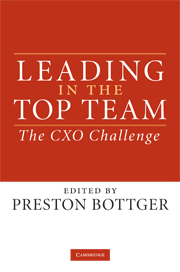Book contents
- Frontmatter
- Contents
- Figures
- Tables
- Contributors
- Editor's Acknowledgments
- 1 Introduction – Leading within and across the functions
- Section I The Business Imperatives
- Section II The CXOs: Within the Functions
- Section III The CEO and the Leadership Team – Pulling it all together
- 17 From CXO to CEO – The weight of accountability
- 18 The Chief Executive Officer – Orchestrating the whole
- 19 Relations Among CXOs – Competing priorities spell trouble
- 20 The Top Team – From executive group to executive team
- Conclusion
- Index
- References
18 - The Chief Executive Officer – Orchestrating the whole
Published online by Cambridge University Press: 19 August 2009
- Frontmatter
- Contents
- Figures
- Tables
- Contributors
- Editor's Acknowledgments
- 1 Introduction – Leading within and across the functions
- Section I The Business Imperatives
- Section II The CXOs: Within the Functions
- Section III The CEO and the Leadership Team – Pulling it all together
- 17 From CXO to CEO – The weight of accountability
- 18 The Chief Executive Officer – Orchestrating the whole
- 19 Relations Among CXOs – Competing priorities spell trouble
- 20 The Top Team – From executive group to executive team
- Conclusion
- Index
- References
Summary
[As CEO] you have to choose which broad areas you will focus on at any given moment … Obviously, a variety of altitudes exist within each of these areas. Moving nimbly in and out of these areas and at different altitudes in each is crucial to leadership success, particularly in times of growth and uncertainty.
(CEO, biotechnology company)The CEO, as the top boss, is ultimately responsible for all the tasks and results surveyed in the chapters to date.
He or she must drive and embody the imperatives of quality, talent and learning, outlined in section 1. He or she is accountable for all the functional decisions covered in section 2 and on how to apportion resources across the functions. He or she must also reconcile the preoccupations of the CXOs with those of the business leaders in operations, where the money is made. It is the CEO who sits on top of the revenue stream and the cost stream.
More generally, the CEO must cater to the needs of the firm's many stakeholders, most notably the shareholders, the customers, the company's top executives and other employees, the board of directors, and suppliers.
These many activities can be grouped into four broad sets of issues on which the CEO must focus:
Growth issues;
Cost issues;
Internal issues; and
External issues.
Before examining these in detail, we will consider how the CEO role has become both more complex and more publicly scrutinized over time.
- Type
- Chapter
- Information
- Leading in the Top TeamThe CXO Challenge, pp. 348 - 364Publisher: Cambridge University PressPrint publication year: 2008



